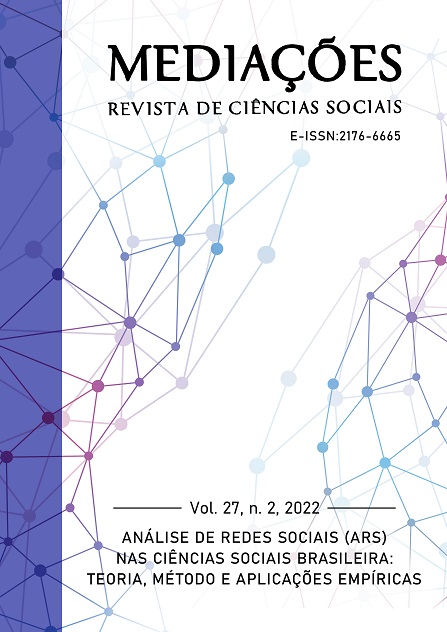Approximations between Nature and Culture in Westworld: World's End, Programming and Free Will
DOI:
https://doi.org/10.5433/2176-6665.2022v27n2e44977Keywords:
Singularity, accelerationism, Westworld, free-will, end-of-the-worldAbstract
This paper's goal is to analyze Warner Bros and HBO's streaming series Westworld, in face of the growing importance of digital technologies in the creation and solution of problems related to the current climate crisis, which can ruin environmental conditions for the survival of humans (and many other species). This analysis will take into account academic, entrepreneurial and fictional debates on the possibilities of the technologies mobilized by the Singularity hypothesis's narratives and imaginaries, which foresee, in its limits, the replacement of biologic nature for computing technology. The conditions of humanity of such new race, from which it should be able to make choices, experience affections and build individual personalities will be brought into discussion, since these are ground aspects for the constitution of both the modern man, upon which laws and governments are directed, and this new post-human man, whose humanity is attested by these very characteristics.
Downloads
References
BLACK Mirror. Produção: Barney Reisz. Londres: Endemol, 2011-2019.
BLAKE, John. Coronavírus traz à tona praga de previsões "do fim dos tempos". CNN, [s.l.], 22 mar. 2020. Disponível em: https://www.cnnbrasil.com.br/internacional/coronavirus-traz-a-tona-praga-de-previsoes-do-fim-dos-tempos/. Acesso em: 13 nov. 2021.
BÖSTROM, Nick. Superinteligência: Caminhos, perigos e estratégias para um novo mundo. Rio de Janeiro: DarkSide Books, 2018.
CHAMAYOU Gregoire. Teoria do drone. São Paulo: Editora Cosac Naif, 2015.
DANOWSKI, Deborah, VIVEIROS DE CASTRO, Eduardo. Há mundo por vir? Ensaio sobre os medos e os fins. Santa Catarina: Cultura e Barbárie Editora, 2017.
DIAMANDIS, Peter. The future is faster than you think. 2019. Disponível em: https://www.diamandis.com/blog/future-is-faster-than-you-think Acesso em: 06/mar/2022.
ELON Musk e Criador de WestWorld fizeram trailer inspirador do Falcon Heavy [2018]. Disponível em: https://www.voicers.com.br/elon-musk-e-criador-de-westworld-fizeram-trailer-inspirador-do-falcon-heavy/. Acesso em: 30 jul. 2021.
FALEIROS, Fabiano Galletti. Fim do humano, vitória da máquina? Indagações Acerca da Singularidade Tecnológica. 2021. Dissertação (Mestrado em Sociologia) - Universidade Estadual de Campinas, Campinas, 2021.
FERRAZ, Maria Cristina Franco, SAINT CLAIR, Ericson. Para além de Black Mirror: estilhaços distópicos do presente. São Paulo: N-1 Edições, 2020.
HARAWAY, Donna. Se nós nunca fomos humanos, o que fazer? [Entrevista concedida à] Nicholas Gane. Tradução: de Ana Leticia de Fiori. Revista Ponto Urbe, São Paulo, n. 6, p. 5, 2010.
HARAWAY, Donna. Staying With The Trouble: Makin Kin In The Chthulucene. Durham: Duke University Press, 2016. DOI: https://doi.org/10.2307/j.ctv11cw25q
JEFF Bezos propose d'envoyer les industries polluantes dans l'espace. 20 Minutes, Paris, 21 jul. 2021. Disponível em: https://www.20minutes.fr/arts-stars/people/3088419-20210721-jeff-bezos-propose-envoyer-industries-polluantes-espace Acesso em: 30 jul. 2021.
KURZWEIL, Ray. A singularidade está próxima: quando os humanos transcendem a biologia. São Paulo: Editora Iluminuras, 2018.
LATOUR, Bruno. Jamais fomos modernos: ensaio de antropologia simétrica. São Paulo: Editora 34, 2019.
MATRIX. Produção: Joel Silver. Los Angeles: Warner Bros, 1999.
MCKINNON, Susan. Genética neoliberal: uma crítica antropológica da psicologia evolucionista. São Paulo: Ubu Editora, 2021.
MEGÍA, Carlos. Bilionários se preparam para o fim da civilização. El País, [s.l.], 3 ago. 2020.
NASA explores the moon and beyond. [S. l.: s. n.], 2022. 1 vídeo (1:24 min). Publicado pelo canal NASA Space Tech. Disponível em: https://www.youtube.com/playlist?list=PL2aBZuCeDwlS_2sGfYSvcoJZLRG069i-H Acesso em: 6 mar. 2022.
NEURALINK monkey mindpong desconstruído. [S. l.: s. n.], 2021. 1 vídeo (27 min). Publicado pelo canal Pódio do Professor Paul. Disponível em: https://www.youtube.com/watch?v=rsCul1sp4hQ.www.youtube.com/watch?v=iwPj0qgvfIs. Acesso em: 30 jul. 2021.
OLIVEIRA GONZALEZ, Cristiana; FERREIRA, Pedro P. Anatomia de um sistema de inteligência artificial. Com Ciência, Campinas, 20 set. 2020. Disponível em: https://www.comciencia.br/anatomia-de-um-sistema-de-inteligencia-artificial/ Acesso em: 30 jul. 2021.
PETER DIAMANDIS. The future Is Faster Than You Think. Vale do Silicio: Global Summit, 2018. 1 vídeo (22 min). Publicado pelo canal Singularity University. 2018. Disponível em: https://www.youtube.com/watch?v=FTTgdtl8FvM Acesso em: 6 mar. 2022.
RANCIÈRE, Jacques. O espectador emancipado. São Paulo: Wmf Martins Fontes, 2012.
REGALADO, Antonio. Brain implants could be the next computer mouse. MIT Technology Review, Massachusetts, 27 out. 2021. Disponível em: https://www.technologyreview.com/2021/10/27/1036821/brain-computer-interface-implant-mouse/?truid=&utm_source=the_download&utm_medium=email&utm_campaign=the_download.unpaid.engagement&utm_term=&utm_content=11-03-2021&mc_cid=235246c825&mc_eid=7f12220127 Acesso em: 10 mar. 2022.
REGALADO, Antonio. Elon Musk's Neuralink demo update is a neuroscience theatre. MIT Technology Review, Massachusetts, 30 ago. 2020. Disponível em: https://technologyreview.com/2020/08/30/1007786/elon-musks-neuralink-demo-update-neuroscience-theater/ Acesso em 15 nov. 2021.
ROGERS, Adam. Neuralink is impressive tech, wrapped in musk hype. Wired Magazine, Nova Iorque, 4 set. 2020. Disponível em: https://www.wired.com/story/neuralink-is-impressive-tech-wrapped-in-musk-hype/ Acesso em: 15 nov. 2021.
ROUVROY, Antoinette; BERNS, Thomas. Governamentalidade Algorítmica e perspectivas de emancipação: o díspar como condição de individuação pela relação? In: BRUNO, Fernanda et al. (org.). Tecnopolíticas da vigilância: perspectivas da margem, São Paulo: Boitempo, 2018.
SAN JUNIPERO. In: WIKIPEDIA: the free encyclopedia. [San Francisco, CA: Wikimedia Foundation, [2016]. Disponível em: https://pt.wikipedia.org/wiki/Terraforma%C3%A7%C3%A3o. Acesso em:4 mar. 2022.
STENGERS, Isabelle. No tempo das catástrofes. São Paulo: Cosac Naif, 2015.
TERMINATOR. Produção: Gale Anne Hurd. Los Angeles: Orion Films, 1984.
TERRAFORMAÇÃO. In: WIKIPEDIA: the free encyclopedia. [San Francisco, CA: Wikimedia Foundation, [2022]. Disponível em: https://pt.wikipedia.org/wiki/Terraforma%C3%A7%C3%A3o. Acesso em: 4 mar. 2022
WESTWORLD: the complete first season. Produtores: Jonathan Nolan e Lisa Joy. Los Angeles: Warner Bros, 2016. 3 discos blu-ray (440 min).
WESTWORLD: the complete second season. Produtores: Jonathan Nolan e Lisa Joy. Los Angeles: Warner Bros, 2018. 3 discos blu-ray (635 min).
WESTWORLD: the complete third season. Produtores: Jonathan Nolan e Lisa Joy. Los Angeles: Warner Bros, 2020. 3 discos blu-ray (492 min).
Downloads
Published
How to Cite
Issue
Section
License
Copyright (c) 2022 Gustavo Lemos

This work is licensed under a Creative Commons Attribution 4.0 International License.
Copyright on articles published in Mediações belongs to the author(s): in the case of partial or entire republication of the original publication, we ask author(s) to indicate the original publication in the periodical.
Mediações uses the Creative Commons Attribution 4.0 International license, which allows Open Access, enabling any user to read, download, copy and disseminate its content so long as adequately referenced.
The opinions expressed by the author(s) are their sole responsibility.
Funding data
-
Coordenação de Aperfeiçoamento de Pessoal de Nível Superior
Grant numbers 88887.607277/2021-00 -
Coordenação de Aperfeiçoamento de Pessoal de Nível Superior
Grant numbers 88887.607277/2021-00
































